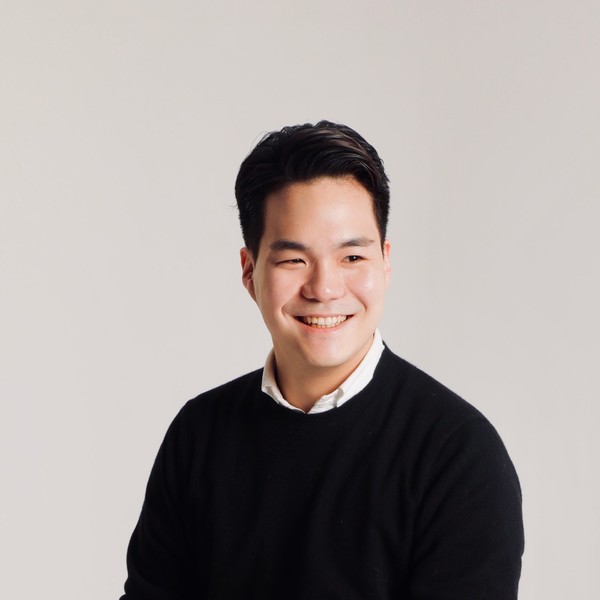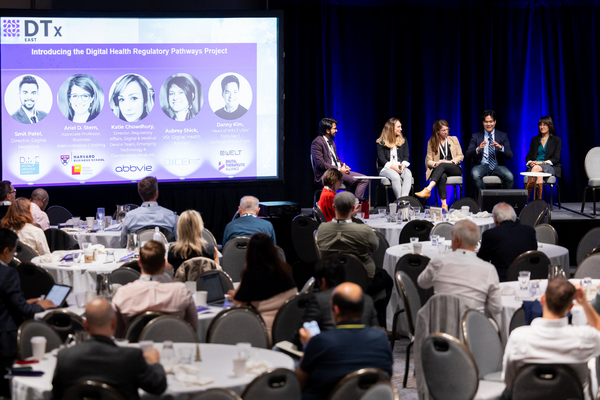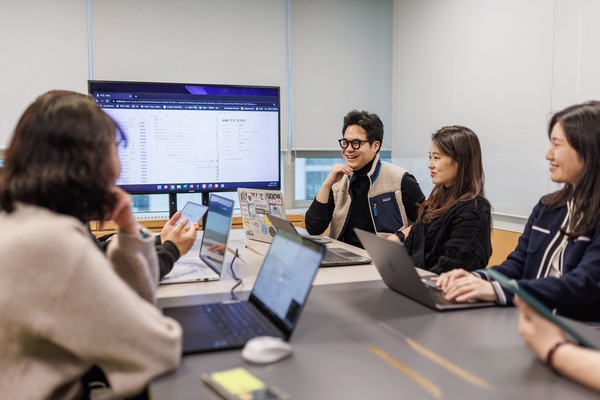Leading a digital healthcare startup
FROM SMARTWATCHES to online pharmacies, technology has permeated healthcare. At the forefront of the digital transformation in health lies ambitious startups that explore the intersection of healthcare and technology and challenge the traditional boundaries of medicine. The Yonsei Annals interviewed Danny Kim, the Head of WELT Corp. USA to gain insight into the digital healthcare industry.

Annals: Could you briefly introduce WELT and your role at the company?
Kim: WELT is a digital healthcare company founded in 2016 by a Yonsei alumnus, Dr. Kang Seong-ji (Class of ’03, Dept. of Medicine). WELT works with digital therapeutics and digital biomarkers. To provide some context, digital healthcare typically refers to the application of technology in medicine where data related to a person’s health is collected, analyzed, and utilized for the improvement of health and well-being.
I joined WELT in 2020 as a Strategic Advisor and am now currently leading WELT USA. My role involves the typical work required by a Chief Executive Officer (CEO), managing partnerships, as well as overseeing regulatory and commercial issues. I build clinical evidence for our digital therapeutics platform, evaluate technology for in-licensing and out-licensing opportunities and look for synergistic effects that can be created from different partnerships.
Annals: What does a typical day at work look like?
Kim: While members of a specific division may work based on project milestones and timelines making their days relatively more predictable, my work varies greatly from day to day. For example, yesterday, I had an emergency board meeting at the Digital Therapeutics Alliance (DTA)[1], a meeting with our law firm to discuss an ongoing licensing deal, another meeting on the marketing plan of our soon-to-launch product, followed by a lecture at a university on digital therapeutics and dinner with a potential investor.
Annals: What was your main motivation to work in the field of digital healthcare?
Kim: It is difficult to describe a single moment that made me determined to pursue this field. Growing up, I was always the first person to try out the new iPhone or the smartwatch; in this sense, there was an inherent appeal of digital healthcare which involves technology. Then, my experiences in university accumulated until digital healthcare became a genuine passion. I think whatever you put your time and energy into becomes what you are good at, and eventually your passion. Many people believe their true calling is waiting around the corner to be discovered, but I believe that passion is fostered, not found.

Annals: How has your experience been working at WELT?
Kim: So far it has been a rollercoaster journey. In 2020, WELT decided to dive into the digital therapeutic space. Now our team is waiting for the first product to be approved by Korea’s Ministry of Food and Drug Safety (MFDS) and has established itself as a leader in the digital therapeutics market.
Throughout the journey, I had the advantage of being the only Korean-speaking person in the United States digital therapeutics community. Leveraging this background, I was able to work with the Korean government in formulating the guidelines for assessing, regulating, and reimbursing digital therapeutics which will be reflected in policy changes. Last November, I won a seat on the board of directors at DTA. Despite one-third of the DTA membership coming from Asia, the Board had been represented by all US companies. Thus, being elected as a board member to represent the interests of the Asia-Pacific region has been one of the proudest moments in my career journey.
Disappointments stem from not being able to move faster in this regulated space. The lack of speed due to regulations is somewhat inevitable as any risks associated with innovative technologies directly affecting human lives must be scrutinized. The Korean regulatory bodies including MFDS and Health Insurance Review and Assessment Service (HIRA)[2] have been supportive and willing to hear opinions from industry players like ourselves.
Annals: Could you describe your other work experience?
Kim: At PillPack, I had the opportunity to work with diverse people from all different fields, including designers, engineers, and pharmacists. After leaving PillPack after the Amazon acquisition, I asked myself where I can expose myself to an even broader and more diverse workforce, and decided to explore Venture Capital (VC)[3]. Working in the VC space was a very colorful and enlightening experience. In the morning, I would be evaluating an Artificial Intelligence (AI) tool that recommends the best cosmetics for one’s skin type or a startup striving to provide affordable dental care. Then in the evening, I would have dinner with a team developing a camera sensor for detecting food items in a refrigerator. The job required me to constantly switch gears from one industry to another. It was exciting and interesting, but I missed working closely with customers and making products on the ground.
Thus, I came back to the startup scene to work at Pear Therapeutics in Boston, and later, at Soundable Health. With my training in PharmD as well as experience in the field of investment and business, I served as an intermediary between our healthcare team, clinical team, and business units. My role has been to develop initiatives and partnerships that can increase the overall value of the company.
Annals: What do you think is a major difference between working at a startup and working at a larger company?
Kim: The major difference is responsibility. In a bigger company, the system is in place which will operate in your absence. In a startup, that is not always the case. Especially at an early stage where there are less than 10, or even 5 people in your team, every member counts. Whereas you tend to be a small piece of a big machine in a large company, you need to be the machine itself or at least a bigger part of the machine at a startup.
As we work with limited resources, startup team members often need to step out of their comfort zones and wear different hats. For example, our engineers may need to read clinical research papers while clinical researchers may need to develop some technical understanding to contribute to a project. Additionally, you need to be comfortable with taking risks and embracing some uncertainty. Having to navigate different fields may be daunting for some people, but for people with a broad range of interests, it is exciting.

Annals: What do you think makes a “good leader” and a “good teammate?”
Kim: Good leadership can be defined in many different ways because there is no one type of leader. In my mind, there are two types of leaders: a kite and a string. A kite flies high, sets the vision, and attracts resources and people, and a string grounds the kite. Apart from types of leadership, I believe general qualities required by a leader are cultural agility—being able to move from one culture, language, and country to another—and dedication—making sure that a task is delivered no matter what, no questions asked. Leaders must also build literacies in data, technology, and humans; they must understand how to interpret and use data and technology and understand what makes humans human.
As for a good teammate, radical candor is the utmost valuable quality. People who are open in communication, especially regarding their vulnerabilities possess the potential to improve. Honest conversations allow team members to share burdens and come up with realistic, feasible solutions to address them.
Annals: Could you describe your university experience? What was your proudest moment and what are some things you wish you would have done differently?
Kim: I majored in Pharmacy at Northeastern University. My university journey was quite unusual for a pharmacy student because, to begin with, I was interested in pursuing anthropology and did not intend on coming to pharmacy school. In the first week of school, I took a wrong turn on campus and ended up attending a lecture on healthcare entrepreneurship. The premise of the lecture was that it does not take a genius to become an entrepreneur and that entrepreneurship is about using limited resources to solve real-life problems. I quickly became interested in this field and decided to explore it further.
I think my greatest accomplishment at Northeastern was creating a healthcare hub called ViTAL. I hosted sessions with inspiring entrepreneurs and alumni who have pursued untraditional career paths in healthcare. The community is still going strong until this day.
Despite the diverse experience I gained from participating in numerous school programs, I think I could have ventured outside the scope of my major, especially to explore the arts, music, or a broader tech scene outside the healthcare space. This is mainly because innovations are caused when two or more seemingly incompatible things collide, just like how digital healthcare bridges two distinct fields of technology and medicine.
Annals: Do you have any advice for undergraduate students who aspire to pursue a similar career path?
Kim: Stay relentlessly curious, be open to new ideas, and ask a lot of questions. If people are able to see how inquisitive and smart you are, you will end up in a position you never imagined yourself in. I often get asked if I had planned on being where I am today five years ago. My answer is that I had absolutely no idea. I was not even certain that I was going to work in the healthcare field. As a student, you are still young, and you really have nothing to lose; so, take risks, stay curious, and seize the opportunity when it comes to you.
[1] Digital Therapeutics Alliance (DTA): A non-profit trade association responsible for voicing opinions on issues related to digital therapeutics by, for instance, proposing a bill to the United States Congress
[2] Health Insurance Review and Assessment Service (HIRA): Government agency responsible for reviews and quality assessments of the National Health Insurance in South Korea
[3] Venture Capital (VC): A form of financing provided to startups and early-stage companies that have high growth potential

